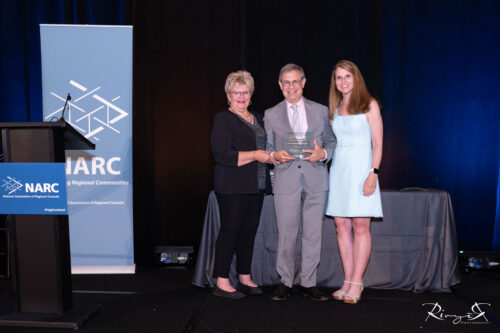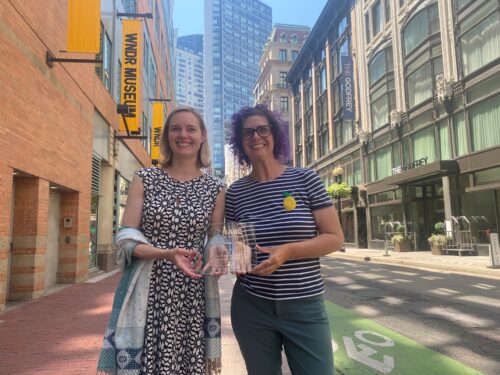MAPC Receives National Recognition for Convening Indigenous Perspectives on Climate Resilience and Sustainability
.
The National Association of Regional Councils awarded the agency for its “Rooted in Nature: Indigenous Knowledge and Climate Resiliency” online speaker series
Atlanta – July 18, 2024 – The National Association of Regional Councils presented the Metropolitan Area Planning Council (MAPC) with a Major Metro Award during an awards ceremony held at its 58th Annual Conference & Exhibition in Atlanta, Georgia. The awards recognize excellence in programs and services of regional councils and metropolitan planning organizations across the country, and MAPC’s “Rooted in Nature: Indigenous Knowledge and Climate Resiliency” project was one of 10 selected from across the country. MAPC Executive Director Marc Draisen accepted the award on behalf of the agency’s Arts and Culture Department.

“Rooted in Nature” was a five-part web series that ran from September through November 2023 and showcased experts from indigenous communities in Massachusetts. The series offered an exploration of indigenous perspectives on climate resilience and sustainability, spotlighting practical examples and case studies rooted in the local context of Massachusetts. The series attracted more than 900 participants from 146 cities and towns in the Commonwealth, 31 total states, and six countries; it has nearly 1,400 views on MAPC’s YouTube channel.
“We are deeply inspired by the climate resilience work being led by Massachusetts’ Native American tribes and individuals,” said MAPC Director of Arts and Culture Annis Whitlow Sengupta, PhD. “Despite the narrative that Native Americans are a historical artifact in Massachusetts, this series reminds us that Native American tribes are very much present in the Greater Boston region and are at the forefront of addressing one of the most pressing crises we face. We are grateful for the opportunity to share their leadership with the planning field and build our audience’s capacity to respectfully engage with Native American tribes and organizations.”

The series aimed to show that by integrating indigenous knowledge into climate resiliency efforts, municipalities can learn from the rich insights and practices developed by local indigenous communities. This inclusive approach enhances the effectiveness of climate adaptation strategies and fosters understanding of indigenous cultures, creating opportunities for collaborations and cross-municipality projects focused on collectively addressing the impacts of climate change.
Senior Regional Humanities Specialist Lindsay Randall added, “As an archaeologist with nearly twenty years of experience collaborating with tribes, I recognize the importance of integrating Indigenous approaches into MAPC's work. By emphasizing the interconnectedness of various topics such as climate, public health, and cultural heritage, we recognize that Western knowledge systems are not the only way to address the issues that affect our region, and that Indigenous knowledge systems offer valuable insights into how we should think about and approach our work. As we designed the program, it was important to us that it also included and uplifted Indigenous priorities through the knowledge exchange of the series. This shift in thinking ensured that MAPC’s efforts led to more effective and inclusive solutions that benefit everyone in our region.”
Speakers and partners in project included:
- Ryann Monteiro, MPH, CHES, an educator, public health practitioner, and indigenous health advocate who is a citizen of the Wampanoag Tribe of Gay Head Aquinnah;
- Leslie Jonas, a native Cape Codder and eel clan member of the Mashpee Wampanoag Tribe. She is an experienced senior planning development strategist with a demonstrated history of working in tribal governments and non-profits.
- Linda Coombs, a citizen of the Wampanoag Tribe on Martha's Vineyard Aquinnah. Coombs has worked for 49 years as a museum educator and spent 11 years at the Boston Children's Museum, 30 years in the Wampanoag Indigenous Program at Plimoth Plantation, and nine years at the Aquinnah Cultural Center;
- Bret Stearns, the Director of the Natural Resource Office of the Wampanoag Tribe of Gay Head (Aquinnah), where he spearheads the design and oversight of various environmental projects;
- and Kristen Wyman, Co-Founder of Eastern Woodlands Rematriation, a grassroots collective of tribal peoples restoring indigenous foodways in the Northeast. In her full-time position as co-director of the Global Movements Program with WhyHunger, Kristen supports and nourishes connections between global movements and initiatives led by indigenous peoples.
MAPC received the award in front of a room filled with regional councils, councils of governments, regional planning and development agencies, Metropolitan Planning Organizations, and other regional organizations. The National Association of Regional Councils (NARC) serves as the national voice for regions by advocating for regional cooperation as the most effective way to address a variety of community planning and development opportunities and issues; its agenda includes transportation, economic and community development, energy and environment, public safety, and a variety of community issues undertaken by its member organizations.
"Congratulations to all the award winners!” said NARC President Carol Vinton. “Their vision, expertise, and dedication have set a new standard of excellence! These awards, and the projects and leadership they celebrate, demonstrate the breadth and quality of work taking place at the regional level.”
PRESS CONTACT
Tim Viall
Senior Communications Specialist
[email protected]
C: 508-965-0456
